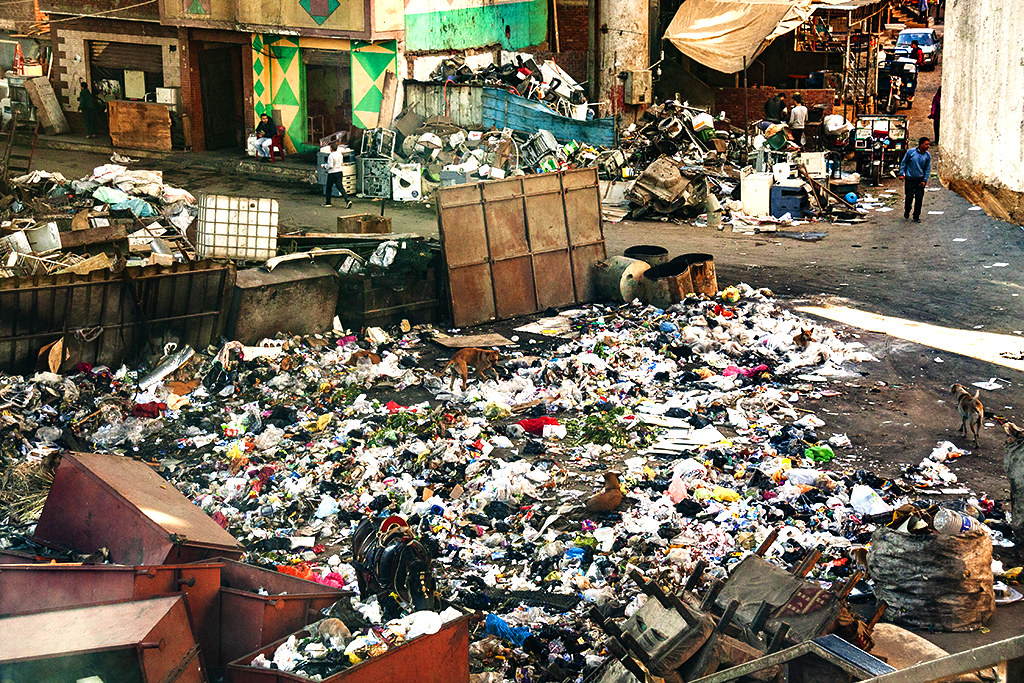.
I stumbled upon this zabbalen section in Al-Sharabiya by accident. Mostly Coptic Christians, zabbaleen are trash collectors who recycle just about everything. This day, I saw salvaged window frames, office chairs, washing machines, dressers, cabinets, wires and pipes, etc, all sorted out and stacked up.
.

3 comments:
Yo Linh!
You will recall how I took you to see Taylor's Alliance Landfill. My friend Dave Siminski gave us a tour.
Is sophisticated; E.P.A. regulations for ground water protection are followed to the max.
If you don't mind, a question.
Beside the part that goes inside animal bellies..., Where does Cairo's massive volume of trash go?
Thanks, Chuck Orloski
Yo Chuck,
Here's Max Rodenbeck in his Cairo: The City Victorious:
"Despite recent government efforts— such as a poster campaign preaching that 'Cleanliness Is a Part of Faith'— the Egyptian capital remains gloriously grubby. Its trash-collection system is a scandal— if, that is, getting the stuff out of sight and mind is assumed to be its goal. Change the objective, however, and it becomes a model of efficiency. Cairo’s waste-disposal industry converts most garbage into usable goods, while employing more people productively than that of any other major city.
"Most of this is achieved without fanfare by a highly organized network of private collectors who trundle about in donkey carts and haul their loads back to the ragpickers’ colonies ringing the city. The zabbālīn, as these people are called, may leave behind a lot.* 2 Their children may spend more time sorting rubbish than at school. The zabbālīn may live surrounded by trash and be shunned because they smell bad, but they have self-respect and job security for generation on generation. They even earn a decent income. And they form a vital link in the city’s economy, supplying thousands of little workshops with recycled raw materials for everything from plastic flip-flops to car parts to television antennae. Discarded clothes turn into multicolored rag rugs. Biodegradable stuff feeds flocks of chickens and ducks and herds of goats and sheep. Even pigs grow fat on Cairo’s waste— since most of this industry happens to be run by Coptic Christians— and produce very tasty pork indeed.
"There was a moment when some minister decided that the zabbālīn were an eyesore. He persuaded the American government to fund a project that would put them out of business. Uncle Sam flew in teams of high-paid experts who devised a new system. Large bins were to be placed on street corners. Giant Mack trucks would patrol. Their pneumatic arms would snatch up the bins and shake their contents into the trucks, which would then drive the waste into the desert and out of sight. This was the civilized way of doing things.
"Cairo trashed the plan in no time flat. To begin with, its garbage was not like the fluffy, styrofoam American kind. It was rich and wet and heavy; and so, one by one, as the bins soared up and tipped their loads, the axles of the costly imported trucks snapped beneath them. The trucks themselves became trash, and their charred skeletons now littered the spontaneously combusting dumps. The bins, too, were badly designed. Their wheels were too small to roll over Cairo’s rough streets. The garbage men couldn’t manipulate them into reach of the trucks, so the bins overspilled and rusted on corners. They became scrabbling grounds for alley cats. In the end, when these receptacles grew so noxious as to be mish ma‘qūl, teenage ragpickers came with palm-fiber baskets and cleaned them out."
Thank you,Linh.
Post a Comment